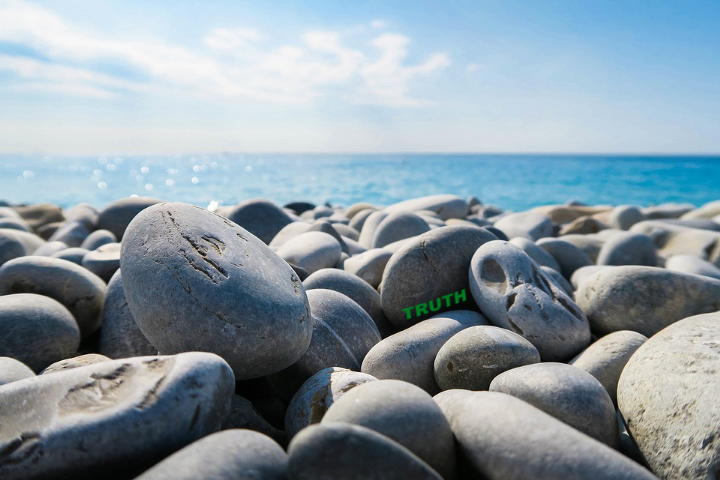
Lonnie Thompson, a climate scientist, was told by his doctor that he needed a heart transplant.
He denied it. “You’re crazy! I’ve been climbing the highest mountains in the world for…” he paused, mentally counted the decades.
Lonnie loved his job. He hiked up to mountain glaciers at 20,000 feet, to retrieve ice cores with the help of a solar-powered drill. He felt fine — it’s just asthma, he told himself — and as long as he needed a heart transplant, he wouldn’t be allowed to go on any more expeditions. Logically, then, his heart must be fine.
He fought his doctor for two years, and kept going on expeditions. Then while drilling in the Alps in 2011, he couldn’t get up from his tent. He couldn’t breathe. Luckily he was able to go down from the mountain, and return to the U.S. where he was admitted to an emergency room, and put on a heart pump.¹
Truth.
Truth has been a lifelong interest of mine: at first, to find out what the truth was, and then later, to figure out what techniques are useful for distinguishing truth from falsehoods.
My interest in questions of truth started with my religion. How can we be sure whether there is a God? If there is, why is it so hard to figure out which religion is true? If he exists, is He good? Would a good God behave the way we have observed? To me, these questions seemed staggeringly important, yet strangely neglected.
“Everyone is entitled to his own opinion, but not his own facts” - a quaint quote from a bygone era
Now my interest in truth has shifted, to the flows of misinformation and disinformation in society.
Last year& I encountered a group on Facebook calling itself “Friends of Science”, buying ads with a simple message:
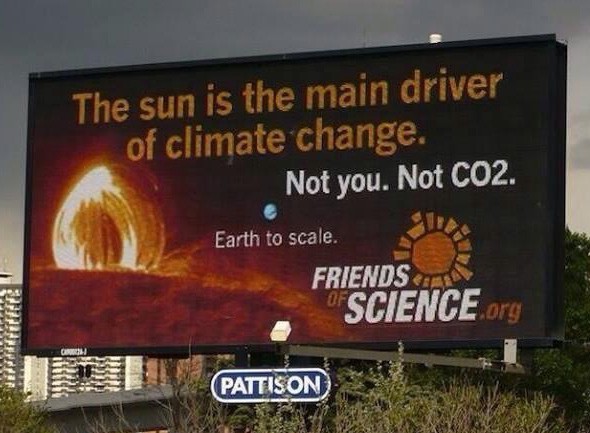
“CO2 does nothing. Why not buy another SUV?”
This led me to speak to a series of people who believe humans don’t cause (significant) global warming, to study climate science for over two months straight, to write anti-denial articles, and finally, to take a course in Global Warming Denial.
The Consensus
During a global cooling trend in the 1970s, climatologists came to a consensus of roughly 84% that CO2 was about to warm up the world. Today that consensus may be as high as 97%, at least among experienced climate scientists.
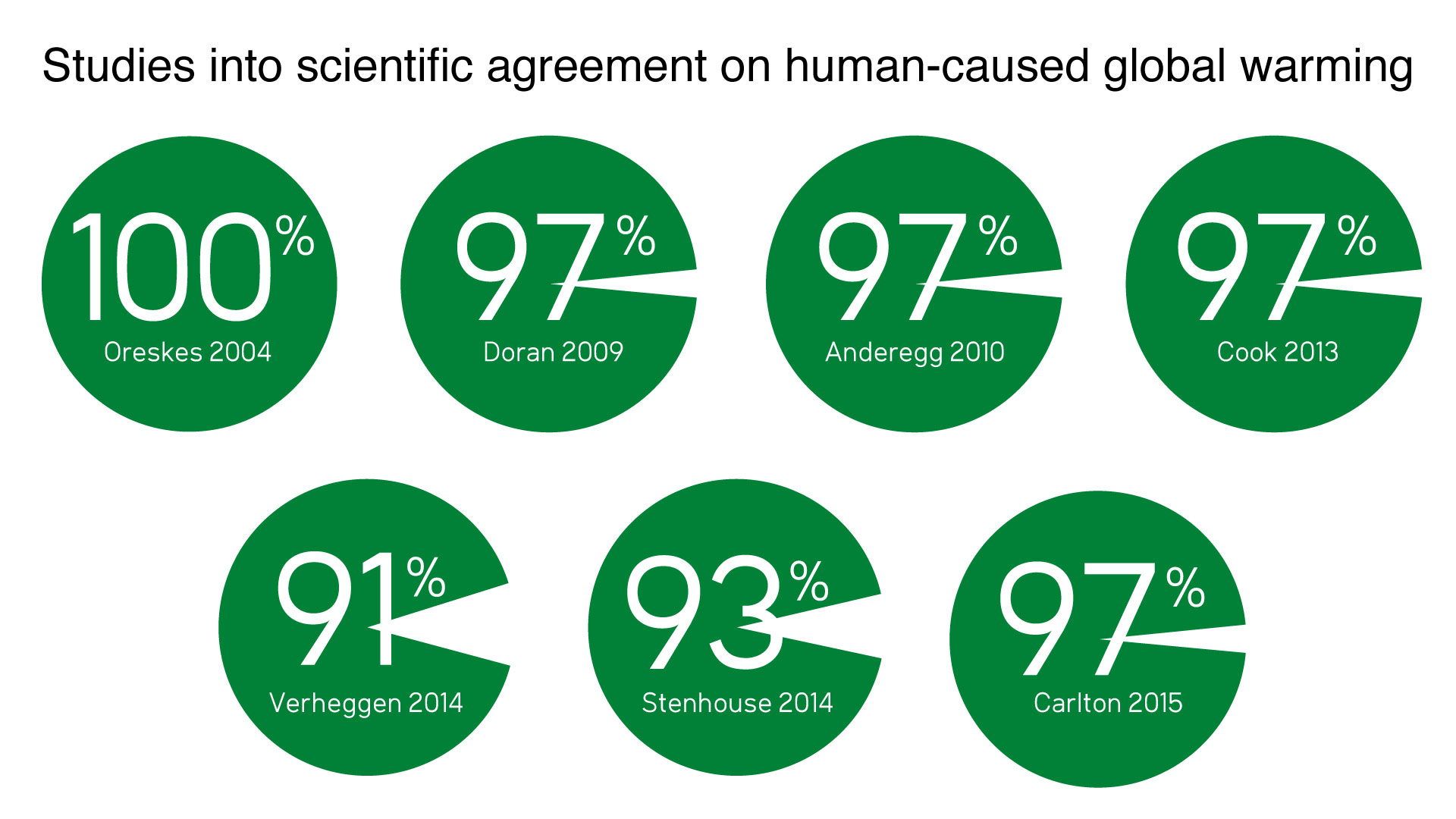
Consensus among expert climatologists. Consensus numbers are lower among novices and non-climate scientists.
“Skeptics” can easily brush those numbers aside using myths that “there’s not really a consensus”. Here are some typical arguments against the consensus:
- “the Doran 2009 study asked only 77 climate scientists if humans were a ‘significant’ contributing factor — any amount could be called significant”: well, other studies explicitly asked if humans caused “most” of the warming, or asked if humans cause at least half, or more than half of warming. Changing the question doesn’t lower the consensus very much, nor does asking more climate scientists.
- “but there’s this petition of 31,000 scientists denying human-caused global warming…” yes, but only 0.1% of those who signed it are climate scientists. The only requirement to sign it is to be an American with a science or engineering degree. Only 0.44% of roughly 7.2 million people eligible to sign it have signed it, despite a mass-mailing campaign by the OISM, the scale of which has been kept secret.
- “in the Cook 2013 study, almost 2/3 of papers examined gave no opinion on AGW (man-made or ‘Anthropogenic’ Global Warming), so this consensus thing is a dishonest manipulation of data.” Why would every single paper have to express an opinion about that? 37% of abstracts since 1990 endorse AGW and 1% reject it, and those numbers reflect a real consensus. Whether humans cause warming is not relevant in most climatology papers, so it need not be mentioned, and if a paper doesn’t express an opinion on AGW, it doesn’t mean the scientists who wrote it don’t have an opinion. In fact, often the same author publishes several papers, and only one of them indicates an opinion on human causation. For example, Cook’s study examined 5 papers by the contrarian Roy Spencer, and only one rejects AGW (and only implicitly, at that). The 3 papers by Lonnie Thompson (our heart-condition denier) are all classified as “No Position”, but his actual opinion is clear. Other studies that gather scientists’ opinions directly show a clear consensus, too.
- “It’s just peer pressure”: surveys answered anonymously have similar results to surveys of public statements by climate scientists.
- “You have to agree with AGW or your funding will get cut off”: Almost 2/3 of climate science papers don’t express any opinion about human causation, so this argument doesn’t hold water; scientists can and do get funding without publicly addressing the causation question. Plus, contrarians are typically government-funded. It seems impossible to convince some people of what’s actually going on: to keep the funding going, you must be able to publish papers in a respectable journal, and to do that you must back up all claims with quantitative evidence, and use sound reasoning.
- “So what? global warming isn’t harmful”: Scientists disagree! In a Pew survey, 77% of “domain experts who are Earth scientists” say it is “a very serious problem” and another 17% say it is “somewhat serious”. Another study found that “41% of scientists believe global climate change will pose a very great danger to the earth in the next 50 to 100 years, compared to 13% who see relatively little danger. Another 44% rate climate change as moderately dangerous.”
People typically talk about “the study” on consensus, when in fact there have been numerous studies, all showing a consensus, generally above 90% (In “Talking to Climate Skeptics” I summarize most of the studies and give links to them). Academies of science in 80 countries endorse the consensus position. None reject it.
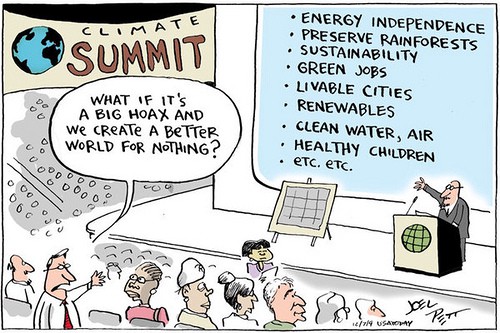
Telling doubters about the consensus (and dispelling anti-consensus myths) often helps them change their mind about global warming. It may also help to point out that dealing with climate change will improve the economy, that it doesn’t have to be expensive or difficult if everyone chips in a little, and that various Republicans support a carbon tax.
But I'm not here to write about doubters. This is about vocal “skeptics”.
You can explain all the above facts to a self-professed “skeptic” and it never changes their mind: they simply ignore you and/or move the goalposts. For instance, I was speaking with a guy who said he “agreed” with the consensus. I quoted consensus studies saying humans cause& “most” of the observed warming, but as the discussion continued he repeatedly changed the word “most” to “some”, so he could keep& saying he agreed with the consensus. After I repeatedly called him out for this, his new position was that climate scientists are all dishonest (initially he denied that this was his position, but later called them scumbags), and said that consensus studies prove climate science isn’t a real science. Why? He says “real” scientists don’t conduct surveys. Months later I caught him pretending to agree with the consensus once again.
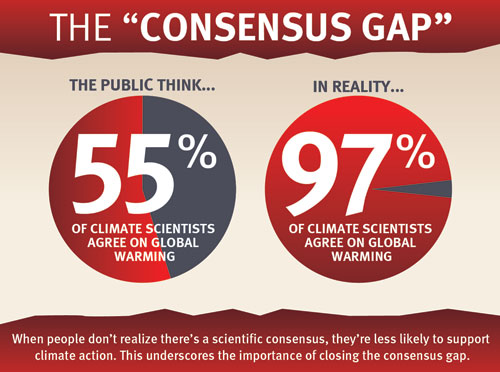
Once you’ve proven beyond any doubt that there is a consensus, their ultimate comfort is that “science isn’t done by consensus”.
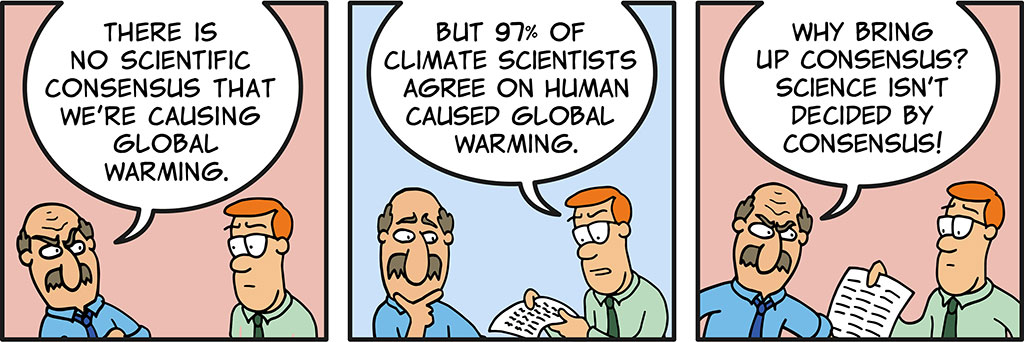
Since truth does not depend on anyone’s opinion, they figure their opinion about what is true outweighs thousands of climate scientists. For them, consensus scientists, no matter their country or background, are incompetent at best, and part of a global conspiracy at worst. For them, the only thing that makes a scientist credible is having the “right” opinions.
Denial101x
Denial 101x is an actual 6-week course about climate science, denial techniques and denial psychology, which you can take free online.
This 3-part series is basically “Denial101x for busy people”.
For a couple of months now I’ve had a personal goal of converting one of these guys. I wanted to know, “how much evidence does it take to convince them?” I learned to take a tactful and nonpolitical approach, with as much friendliness as I could muster — which often wasn’t that much, admittedly. After learning the science inside and out, and spending dozens of hours talking to specific people who deny AGW, the answer seems to be “It’s virtually impossible. Don’t bother.” While I talked to about a dozen of these guys, I worked harder on 6 of them. My final score: 1 out of 6. My one success story? A Canadian. And it wasn't 100% success. Just sorta-kinda.
Here’s what I’ve learned by talking to these guys:
They don’t like the word “denier” (and “denialist”)
You would think that “AGW denier” is a sensible shorthand for “person who denies human-caused (Anthropogenic) Global Warming is real, or a real problem”.
But getting offended whenever someone says “denier” is a smart strategy. Either they can force you to use the word they choose, which is “skeptic”, or they have an excuse to ignore your arguments, by claiming “denier” is a “slur” which makes you untrustworthy for saying it. (Despite this concern about labels, they still call mainstream climate scientists “alarmists”.)
The word “skeptic” is inaccurate, though, since their skepticism is selective. They were taught to be “skeptics” using a series of anti-science myths. They not only believe the myths, but when I try to debunk them, they often act as though I hadn’t said anything at all. Instead they change the subject or respond only to something else that I said. Real skeptics are evidence-driven, and do not simply ignore information that refutes their position.
“Science is not a democracy. It’s a dictatorship, and it’s the evidence that does the dictating” - John Reisman
Some have suggested other terms, such as “pseudo-skeptic” and “citizen scientist”. Originally this article used the term “denier”, but I’ve decided to switch the text to use “pseudo-skeptic” in an effort to increase neutrality. I’ve reserved the word “contrarian” for those rare individuals who have credentials in climate science, but still disagree with the consensus. (Edit: George Marshall suggests “dissenters”; others have suggested “dismissive”.)
It's a political debate dressed up as a science debate
Most Americans live in the Eastern U.S., which warmed less than the global average. This may help denial, but political beliefs matter far more.
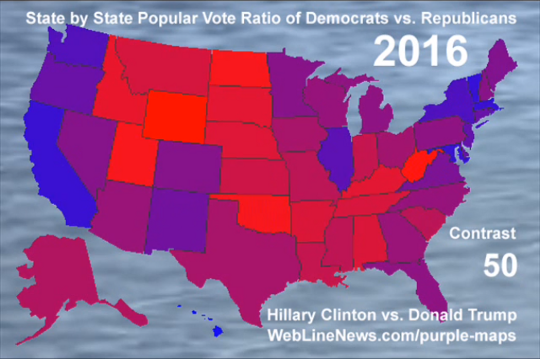 |
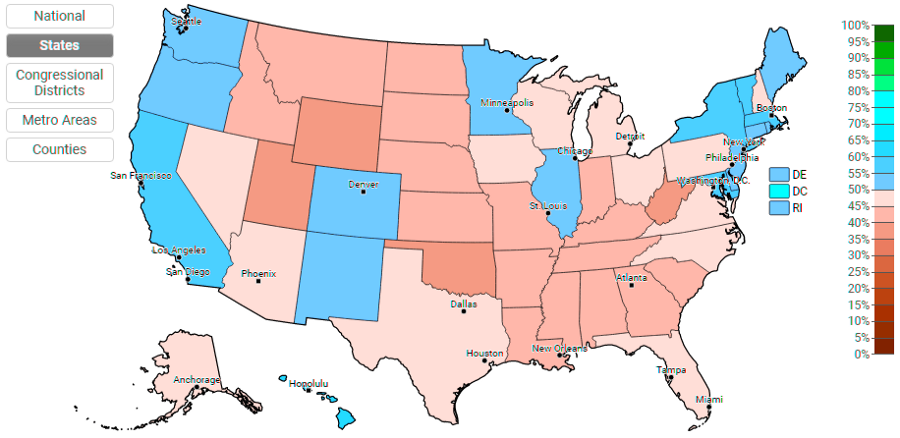 |
Left side in red: votes for Trump. Right side in brown: states where people do not believe “most scientists think global warming is happening”.
A Pew poll asks if “Earth is warming due mostly to human activity?” Only 15% of Republican voters agree (22% in another poll), compared to 79% of Democrat voters. It’s a testament to the power of propaganda on this issue that even Democrats show a lower consensus than climate science experts.
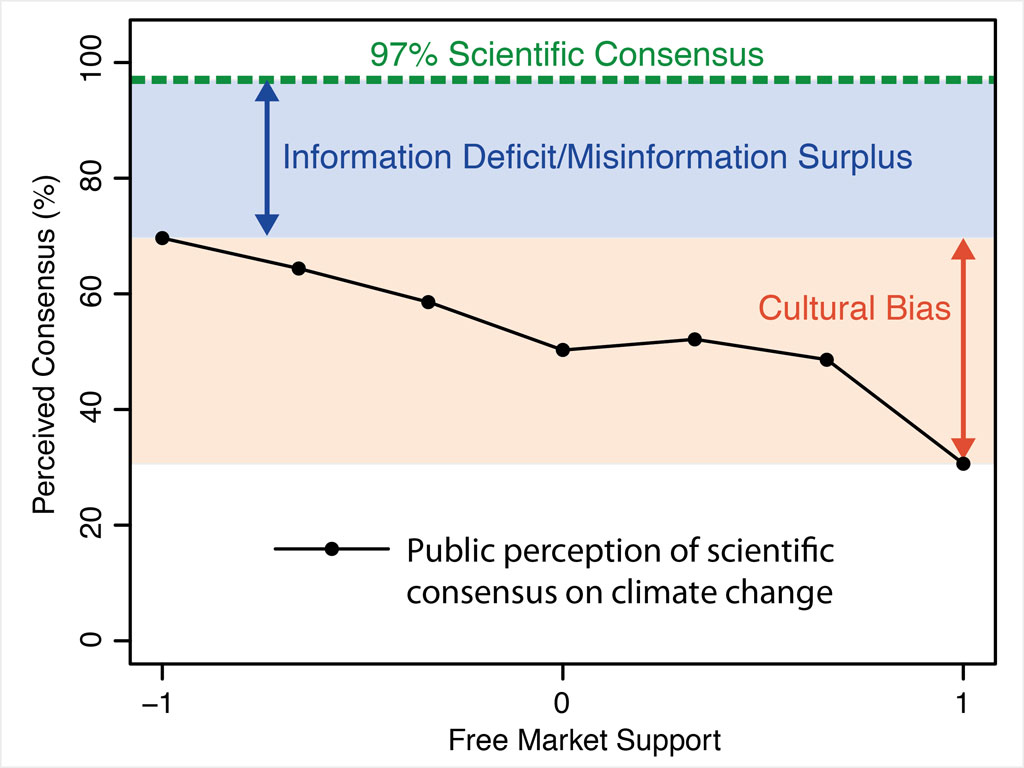
Graph by John Cook
The Denial Community
There are two climate scientists who publish contrarian blogs: Roy Spencer and Judith Curry, both American conservatives. The pseudo-skeptic community rallies around them as beacons of truth. Both of them want to minimize the appearance of human influence, but neither claim that there is no human influence.
Spencer wrote a book on free-market economics, and once said “I view my job a little like a legislator, supported by the taxpayer, to protect the interests of the taxpayer and to minimize the role of government”. Spencer emphasizes his own UAH dataset, which shows the smallest warming trend out of all available datasets (four different compilations of land and sea data by three countries, as well as weather balloons and RSS data, show more warming). Curry pushes an “uncertainty” angle — that we don’t know enough about what’s going on and climate scientists can’t be trusted to tell us. Pseudo-skeptics may combine such contrarian opinions with myths they’ve seen elsewhere to build a more complete story for themselves.
The tiny minority of credentialed contrarians are propped up by an enormous web of denial blogs written by non-climate scientists and non-scientists, such as “ClimateDepot” (by the Washington DC conservative outfit CFACT), the conservative Heartland Institute, WattsUpWithThat (headed by conservative TV meteorologist Anthony Watts), “RealClimateScience” (not to be confused with RealClimate.org, a blog by real climate scientists), NoTricksZone (with writers such as Kenneth Richard who I have examined before), Tony Heller (a longtime conspiracy theorist who used to go by the alias Steve Goddard), JoNova, and “Friends of Science”. Even publications like Washington Post and Forbes have published articles from professional pseudo-skeptics like James Taylor (Heartland Institute), and the New York Times recently hired conservative pseudo-skeptic Bret Stephens.
Next time: Tactics of Denial
¹ Story adapted from a& Denial101x interview
Comments